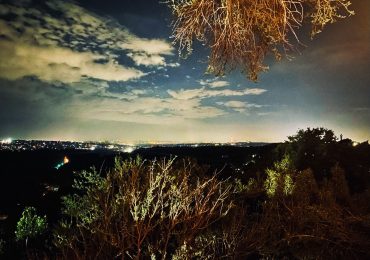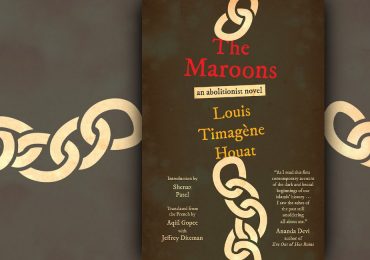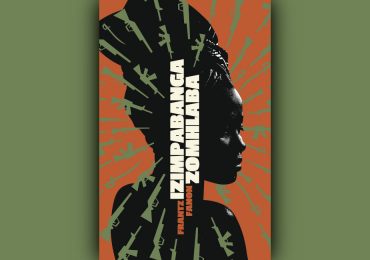The shortlist for the 2019 Man Booker International Prize, celebrating the ‘finest works of translated fiction from around the world’, has been announced.
The six novels on the shortlist represent an all-female list of translators alongside five female authors.
For the Man Booker International, authors are honoured along with their translators, and share £50,000 prize money between them. Each shortlisted author and translator also receives £1,000.
This year’s stories include the pilgrimage of a lecturer on beard fashions over the pine islands of Matsushima, a tale of Colombian conspiracy theories, and an environmental whodunnit with a cast of eccentric characters. Family connections and history are also present in the coming-of-age account of three Omani sisters, the story of three children of ex-militants overcoming Chile’s complex past, and an evocative narrative of France from 1941 to 2006 which blends the personal and the collective to present memories of a generation.
2019 Man Booker International Prize shortlist
- Celestial Bodies by Jokha Alharthi (Oman), translated from Arabic by Marilyn Booth (Sandstone Press)
- The Years by Annie Ernaux (France), translated by Alison Strayer (Fitzcarraldo Editions)
- The Pine Islands by Marion Poschmann (Germany), translated by Jen Calleja (Serpent’s Tail)
- Drive Your Plow Over the Bones of the Dead by Olga Tokarczuk (Poland), translated by Antonia Lloyd-Jones (Fitzcarraldo Editions)
- The Shape of the Ruins by Juan Gabriel Vásquez (Colombia), translated from Spanish by Anne McLean (MacLehose Press)
- The Remainder by Alia Trabucco Zerán (Chile and Italy), translated from Spanish by Sophie Hughes (And Other Stories)
The six shortlisted books have been translated from five languages—Arabic, French, German, Polish and Spanish—and hail from five countries on three continents.
Olga Tokarczuk, who won the prize in 2018 for Flights, translated by Jennifer Croft, has been shortlisted again, this time for her novel Drive Your Plow Over the Bones of the Dead, alongside her other translator into English, Antonia Lloyd-Jones.
The shortlist also includes Celestial Bodies by Jokha Alharthi, who was the first writer from the Arabian Gulf to be longlisted for the prize, and The Years by Annie Ernaux and translated by Alison L Strayer, which has already won prizes including the Prix Renaudot in France and Premio Strega in Italy.
Alia Trabucco Zerán makes the list with her debut novel The Remainder, translated by Sophie Hughes.
The shortlist is dominated by independent publishers, with two books from Fitzcarraldo Editions, and one each from Sandstone Press, Profile Books and Serpent’s Tail.
Bettany Hughes, chair of the 2019 Man Booker International Prize judging panel, says: ‘Wisdom in all its forms is here. Unexpected and unpredictable narratives compelled us to choose this vigorous shortlist. Subversive and intellectually ambitious with welcome flashes of wit, each book nourishes creative conversation. We were struck by the lucidity and supple strength of all the translations.’
The shortlist was selected by a panel of five judges, including historian, author and broadcaster Bettany Hughes (chair); writer, translator and chair of English PEN Maureen Freely; philosopher Professor Angie Hobbs; novelist and satirist Elnathan John and essayist and novelist Pankaj Mishra.
The winner of the 2019 prize will be announced on 21 May 2019 at a formal dinner at the Roundhouse in London.
Book synopses and biographies, from the Man Booker International Prize
- Celestial Bodies by Jokha Alharthi (Oman), translated from Arabic by Marilyn Booth (Sandstone Press)
Celestial Bodies is set in the village of al-Awafi in Oman, where we encounter three sisters: Mayya, who marries Abdallah after a heartbreak; Asma, who marries from a sense of duty; and Khawla who rejects all offers while waiting for her beloved, who has emigrated to Canada. These three women and their families witness Oman evolve from a traditional, slave-owning society which is slowly redefining itself after the colonial era, to the crossroads of its complex present. Elegantly structured and taut, it tells of Oman’s coming-of-age through the prism of one family’s losses and loves.
The judges said:
‘A richly imagined, engaging and poetic insight into a society in transition and into lives previously obscured.’
Jokha Alharthi was born in Oman in July 1978. She is the author of two previous collections of short fiction, a children’s book, and three novels in Arabic. Fluent in English, she completed a PhD in Classical Arabic Poetry in Edinburgh, and teaches at Sultan Qaboos University in Muscat. She has been shortlisted for the Sahikh Zayed Award for Young Writers and her short stories have been published in English, German, Italian, Korean, and Serbian. She lives in Oman.
Marilyn Booth was born in Boston, USA in February 1955. She holds the Khalid bin Abdallah Al Saud Chair for the Study of the Contemporary Arab World, Oriental Institute and Magdalen College, Oxford. In addition to her academic publications, she has translated many works of fiction from Arabic, most recently, The Penguin’s Song and No Road to Paradise, both by Lebanese novelist Hassan Daoud. She lives in Oxford.
- The Years by Annie Ernaux (France), translated by Alison Strayer (Fitzcarraldo Editions)
The Years is a narrative of the period 1941 to 2006 told through the lens of memory, impressions past and present, photos, books, songs, radio, television, advertising, and news headlines. Local dialect, words of the times, slogans, brands and names for ever-proliferating objects are given voice. The author’s voice continually dissolves and re-emerges as Ernaux makes the passage of time palpable. Time itself, inexorable, narrates its own course, consigning all other narrators to anonymity. A new kind of autobiography emerges, at once subjective and impersonal, private and collective.
The judges said:
‘An elegant portrait of an age; a much needed riposte to the ever-narrowing trajectory of auto-fiction.’
Annie Ernaux was born in Seine-Maritime, France, in September 1940. She grew up in Normandy, studied at Rouen University, and later taught in secondary schools. From 1977 to 2000, she was a professor at the Centre National d’Enseignement par Correspondance. Her books, in particular A Man’s Place and A Woman’s Story, have become contemporary classics in France. The Years won the Prix Renaudot in France in 2008 and the Premio Strega in Italy in 2016. In 2017, Annie Ernaux was awarded the Marguerite Yourcenar Prize for her life’s work. She lives in Paris, France.
Alison Strayer was born in Saskatchewan, Canada, in July 1958. A writer and translator, her work has been shortlisted twice for the Governor General’s Award for Literature and for Translation. She has also been shortlisted for the Grand Prix du Livre de Montréal and the Prix Littéraire France-Québec, and longlisted for the Albertine Prize. Her translation of The Years was awarded the 2018 French-American Translation Prize in the non-fiction category. She lives in Paris, France.
- The Pine Islands by Marion Poschmann (Germany), translated by Jen Calleja (Serpent’s Tail)
When Gilbert Silvester, a journeyman lecturer on beard fashions in film, awakes one day from a dream that his wife has cheated on him, he flees—immediately, irrationally, inexplicably—for Japan. In Tokyo he discovers the travel writings of the great Japanese poet Basho. Suddenly, from Gilbert’s directionless crisis there emerges a purpose: a pilgrimage in the footsteps of the poet to see the moon rise over the pine islands of Matsushima. Falling into step with another pilgrim—a young Japanese student called Yosa, clutching a copy of The Complete Manual of Suicide—Gilbert travels across Basho’s disappearing Japan with Yosa, one in search of his perfect ending and the other the new beginning that will give his life meaning. The Pine Islands is a serene, playful, profoundly moving story of the transformations we seek and the ones we find along the way.
The judges said:
‘A quirky, unpredictable and darkly comic confrontation with mortality.’
Marion Poschmann was born in Essen, Germany, in December 1969. A prize-winning poet and novelist, she has won both of Germany’s premier poetry prizes, has been longlisted once and shortlisted twice for the German Book Prize and won, amongst others, the 2013 Wilhelm Raabe Literature Prize, the first German Prize for Nature Writing 2017 and the 2018 Berlin Literature Prize for her prose. She is a member of the German Academy for Language and Literature and the German PEN Centre. She lives in Berlin.
Jen Calleja was born in Shoreham-by-Sea, UK, in December 1986. She is a writer, musician and literary translator from German. She has translated works by authors including Wim Wenders, Michelle Steinbeck, Kerstin Hensel and Gregor Hens, and her translations have been featured in The New Yorker and The White Review. She was the inaugural Translator in Residence at the British Library and writes a column on literature in translation for the Brixton Review of Books. Her debut poetry collection Serious Justice (2016) is published by Test Centre. She lives in London.
- Drive Your Plow Over the Bones of the Dead by Olga Tokarczuk (Poland), translated by Antonia Lloyd-Jones (Fitzcarraldo Editions)
Drive Your Plow Over the Bones of the Dead takes place in a remote village in south-west Poland where Janina Dusezjko, an eccentric woman in her sixties, describes the events surrounding the disappearance of her two dogs. When members of a local hunting club are subsequently found murdered, she becomes involved in the investigation. By no means a conventional crime story, Drive Your Plow Over the Bones of the Dead offers thought-provoking ideas on perceptions of madness, social injustice against people who are marginalised, animal rights, the hypocrisy of traditional religion, and belief in predestination.
The judges said:
‘An idiosyncratic and bleakly humorous indictment of humanity’s casual corruption of the natural world.’
Olga Tokarczuk was born in Julechon, Poland, in January 1962. One of Poland’s best and most beloved authors, her novel Flights won the 2018 Man Booker International Prize, in Jennifer Croft’s translation. In 2015 she received the Brueckepreis and the prestigious annual literary award from Poland’s Ministry of Culture and National Heritage, as well as Poland’s highest literary honour, the Nike and the Nike Readers’ Prize. Tokarczuk also received a Nike in 2009 for Flights. She is the author of nine novels, three short story collections and has been translated into a dozen languages. She lives in Wrocław, Poland.
Antonia Lloyd-Jones was born in Oxford in March 1962. She translates from Polish, and is the 2018 winner of the Transatlantyk Award for the most outstanding promoter of Polish literature abroad. She has translated works by several of Poland’s leading contemporary novelists and reportage authors, as well as crime fiction, poetry and children’s books. She is a mentor for the Emerging Translators’ Mentorship Programme, and former co-chair of the UK Translators Association. She lives in London.
- The Shape of the Ruins by Juan Gabriel Vásquez (Colombia), translated from Spanish by Anne McLean (MacLehose Press)
While pacing the dark and lonely corridors of a hospital in Bogotá during the premature birth of his twin daughters, Juan Gabriel Vásquez befriends a kindly physician, Doctor Benavides. Through the doctor, Vásquez meets Carlos Carballo. A middle-aged man, Carballo is consumed by a conspiracy theory about the assassination of an up and coming politician and JFK-like figure Jorge Eliécer Gaitán in 1948. He tries to persuade Vásquez to write a novel about the murder, but despite repeated refusals Vásquez is drawn deeper into the conspiracy when Gaitán’s vertebrae, stored in a glass jar in a mutual friend’s house, goes missing. Sparking a turn of events, Varquez opens up a second, even darker conspiracy about the assassination of another politician, Rafael Uribe Uribe, in 1914.
The judges said:
‘A harrowing immersion into the bottomless pit of conspiracy theories. Rooted in Colombian history, it speaks to a central question of our times.’
Juan Gabriel Vásquez was born in Bogotá, Colombia, in January 1973. He is the author of four previous novels, The Informers, The Secret History of Costaguana, The Sound of Things Falling and Reputations, as well as the story collection The All Saints’ Day Lovers. He is the winner of many prizes including the 2014 International IMPAC Dublin Literary Award for The Sound of Things Falling (jointly with his translator Anne McLean), the 2013 Gregor von Rezzori Prize and the 2011 Alfaguara Prize. He has translated works into Spanish and his own work has been translated into more than 20 languages. He lives in Bogotá.
Anne McLean was born in Hamilton, Ontario, Canada, in November 1962. She has translated Latin American and Spanish novels, stories, memoirs and other writings by many authors including Hector Abad, Javier Cercas, Julio Cortazar and Enrique Vila-Matas. She has won the Independent Foreign Fiction Prize twice, for Soldiers of Salamis by Javier Cercas (2004) and for The Armies by Evelio Rosero (2009). In 2012 she was awarded the Spanish Cross of the Order of Civil Merit. She lives in Toronto.
- The Remainder by Alia Trabucco Zerán (Chile and Italy), translated from Spanish by Sophie Hughes (And Other Stories)
Santiago, Chile. The city is covered in ash. Three children of ex-militants are facing a past they can neither remember nor forget. Felipe sees dead bodies on park benches, counting them up in an obsessive quest to square the figures with the official death toll. He is searching for the perfect zero, a life with no remainder. Iquela and Paloma are also searching for a way to live on. When the body of Paloma’s mother gets lost in transit, the three take a hearse and a handful of pills up the cordillera for a road trip with a difference. Intense, intelligent, and extraordinarily sensitive to the shape and weight of words, this remarkable debut presents a new way to count the cost of generational trauma.
The judges said:
‘A lyrical evocation of Chile’s lost generation, trying ever more desperately to escape their parents’ political shadow.’
Alia Trabucco Zerán was born in Santiago, Chile in August 1983. She was awarded a Fulbright scholarship for her MFA in Creative Writing at New York University and holds a PhD in Spanish and Latin American Studies from University College London. The Remainder is her debut novel. It won the Best Unpublished Literary Work awarded by the Chilean Council for the Arts in 2014, and on publication was chosen by El País as one of its top ten debuts of 2015. She lives in London.
Sophie Hughes was born in Chertsey, UK, in June 1986. She has translated novels by several contemporary Latin American and Spanish authors, including Best Translated Book Award 2017 finalist Laia Jufresa’s Umami. Her translations, reviews and essays have been published in The Guardian, The White Review, Times Literary Supplement. She has been the recipient of a British Centre for Literary Translation mentorship and residency, a PEN Heim Literary Translation grant, and in 2018 she was shortlisted for an Arts Foundation 25th Anniversary Fellowship. She lives in Birmingham.





